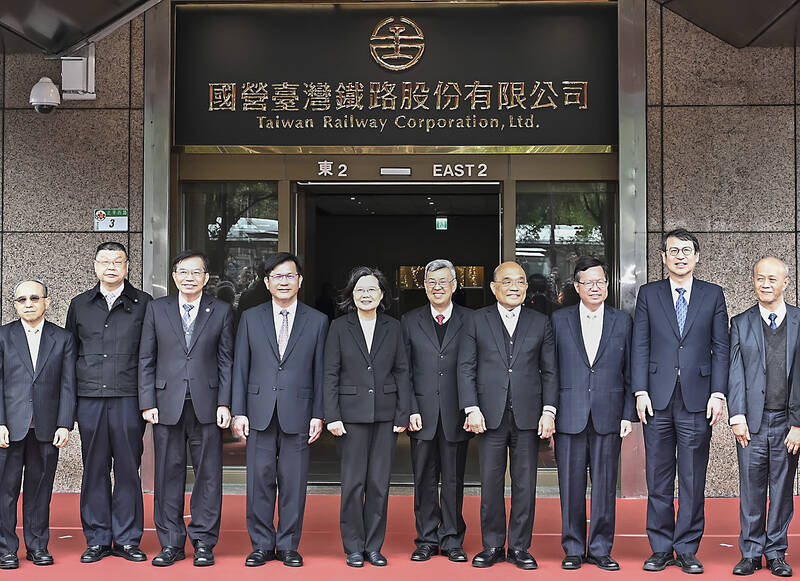The Taiwan Railways Administration (TRA) yesterday officially became the state-run Taiwan Railway Corp (TRC), with the management of the newly established firm vowing to provide a safe and efficient service.
President Tsai Ing-wen (蔡英文), Premier Chen Chien-jen (陳建仁), former premier Su Tseng-chang (蘇貞昌), Minister of Transportation and Communications Wang Kwo-tsai (王國材) and other officials attended the inauguration ceremony, unveiling the new sign for the nation’s oldest and largest railway system, which has been in operation since 1887.
Tsai said that TRA carried a heavy financial burden because it was charged to operate many unprofitable routes, adding that the significant amount of pension fund contributions that had to be distributed to TRA employees as well as the agency’s asset management added further economic expenses.

Photo: Chen Chih-chu, Taipei Times
The plan to corporatize the railway agency was proposed in 2002 and was scheduled to be completed in 2004, but it did not materialize until after two major fatal derailments in 2018 and 2021, which convinced the public that a comprehensive reform at the agency was necessary.
“It took more than 20 years for the TRA to become a state-run railway corporation. The government had been trying to find the best solutions to minimize the impact of the systematic change on workers while reforming the agency to ensure a safe and stable operation,” Tsai said.
“We thank the families of victims for helping the railway agency transform into a state-run company and push for safety reform,” she said.
The government would continue to subsidize the railway firm to relieve its financial burden and help it develop its properties to ensure efficient, sustainable and safe operations, Tsai said.
TRC chairman Du Wei (杜微) said the company has to raise ticket prices, adding that the prices have not been adjusted for more than 20 years.
“We will make sure that safety and service issues are addressed first, but we begin studying
ticketing-related issues this year. We will also gauge the public’s attitude and suggestions before making any change,” Du said.
The TRA had accumulated a short-term debt of about NT$170 billion (US$5.5 billion), which would now be repaid by a fund established solely for the purpose of servicing the debt, Du added.
“The company now starts from square one. We will pay special attention to our financial
soundness… The company’s cash flow is projected to turn positive by 2026. As for the accounting, the financial statement is expected to turn from a loss to a profit in 2028 due to huge depreciation write-offs,” he said.
Du also said that the company has a staffing shortage of about 1,000 to 1,100 people, adding that the staff would soon be replenished with new employees recruited during the second half of next year.
New employees would undergo intensive educational training before they can officially be placed on duty, he said.
As the Taiwan Railway Union is scheduled to vote on whether to go on strike during the Lunar New Year holiday, Du said that the company would negotiate with the union as quickly as possible.

A relatively large earthquake may strike within the next two weeks, following a magnitude 5.2 temblor that shook Taitung County this morning, the Central Weather Administration (CWA) said. An earthquake struck at 8:18am today 10.2km west of Taitung County Hall in Taitung City at a relatively shallow depth of 6.5km, CWA data showed. The largest intensity of 4 was felt in Taitung and Pingtung counties, which received an alert notice, while areas north of Taichung did not feel any shaking, the CWA said. The earthquake was the result of the collision between the Philippine Plate and the Eurasian Plate, the agency said, adding

Snow fell in the mountainous areas of northern, central and eastern Taiwan in the early hours of yesterday, as cold air currents moved south. In the northern municipality of Taoyuan, snow started falling at about 6am in Fusing District (復興), district head Su Tso-hsi (蘇佐璽) said. By 10am, Lalashan National Forest Recreation Area, as well as Hualing (華陵), Sanguang (三光) and Gaoyi (高義) boroughs had seen snowfall, Su said. In central Taiwan, Shei-Pa National Park in Miaoli County and Hehuanshan National Forest Recreation Area in Nantou County saw snowfall of 5cm and 6cm respectively, by 10am, staff at the parks said. It began snowing

HOLIDAY EXERCISE: National forest recreation areas from north to south offer travelers a wide choice of sights to connect with nature and enjoy its benefits Hiking is a good way to improve one’s health, the Forestry and Nature Conservation Agency said, as it released a list of national forest recreation areas that travelers can visit during the Lunar New Year holiday. Taking a green shower of phytoncides in the woods could boost one’s immunity system and metabolism, agency Director-General Lin Hwa-ching (林華慶) cited a Japanese study as saying. For people visiting northern Taiwan, Lin recommended the Dongyanshan National Forest Recreation Area in Taoyuan’s Fusing District (復興). Once an important plantation in the north, Dongyanshan (東眼山) has a number of historic monuments, he said. The area is broadly covered by

Global bodies should stop excluding Taiwan for political reasons, President William Lai (賴清德) told Pope Francis in a letter, adding that he agrees war has no winners. The Vatican is one of only 12 countries to retain formal diplomatic ties with Taiwan, and Taipei has watched with concern efforts by Beijing and the Holy See to improve ties. In October, the Vatican and China extended an accord on the appointment of Catholic bishops in China for four years, pointing to a new level of trust between the two parties. Lai, writing to the pope in response to the pontiff’s message on Jan. 1’s